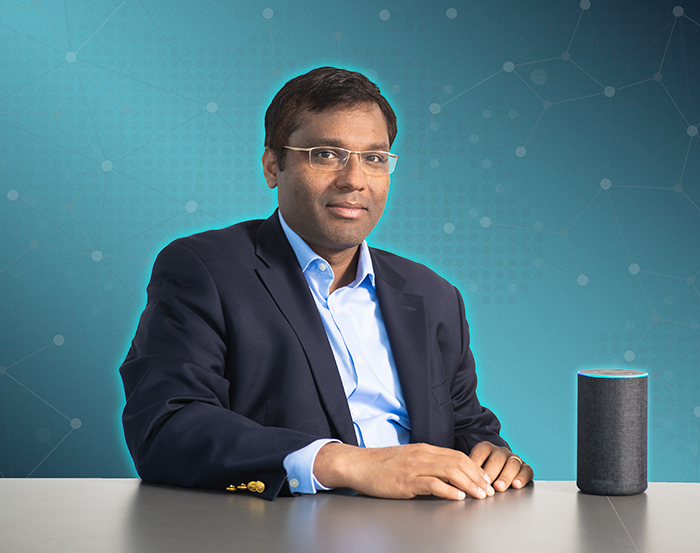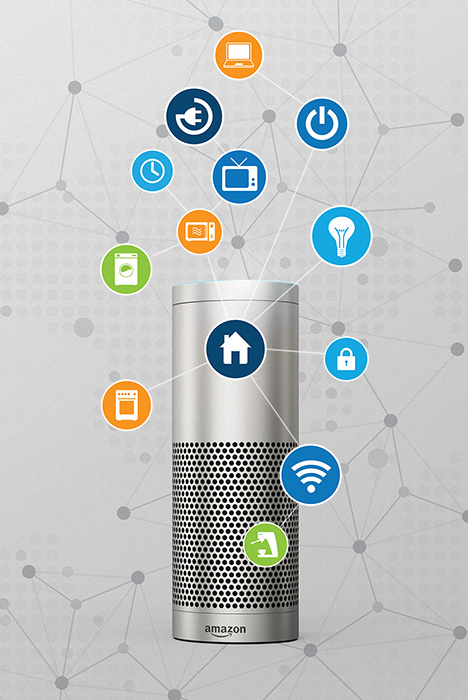
Alexa, Challenge Me
From the time that Rohit Prasad (M.S. EE ’99)—now vice president and head scientist for Amazon Alexa—had his first serious talk with his father about the direction of his life, he had his eyes on the proverbial prize.
P
rasad told his father that he didn’t want to become the third-generation member of their family to go into mechanical engineering but rather, wished to pursue computer science or electronics and communications, because he saw them as being the fields of the future. That Prasad grew up in the “to boldly go where no man has gone before” Star Trek era only added to his vision. On Mies Campus to deliver the 2018 Darsh T. Wasan Lecture last November, in which he discussed some of the latest advancements in Alexa (see sidebar), Prasad animatedly recalled his fascination with science fiction and how it inspired his dreams to explore artificial intelligence.
“I had a clear passion for human-computer interaction even back then,” he says. “It was easy to imagine talking to machines.”
While determining which college to attend, Prasad had read about former Illinois Tech faculty member Geoffrey Chan’s work in speech compression and coding. After a phone conversation with Chan from his home in Ranchi, India, Prasad decided to enroll at Illinois Tech. He says that his work with Chan on low-bit-rate speech compression satisfied his intellectual interests then, but as Prasad neared the completion of his degree program, he knew that he needed new challenges and a new direction.
“There was less opportunity to make a tectonic shift in that field [speech compression] because the technology had already become good. I wanted to explore something more nascent that would provide tons of hard problems for the next 20 years,” says Prasad, noting how the Amazon Alexa voice service project is the ideal outcome of his longstanding desire to discover innovative ways for humans and computers to interact.
“I want Alexa to be everywhere for everyone.”
–Rohit Prasad
“From that point I turned to trying to learn more about how our brains work. We still understand so little, and what we have been able to do is based on exponential data and some modeling. Alexa is a great example of data-driven machine learning and AI. Understanding exactly how the human brain works is the ultimate goal,” he says.
Before being recruited to Amazon in 2013 as director of machine learning, Prasad was on the staff of Raytheon BBN Technologies, advancing from staff scientist to deputy manager and senior director of speech, language, and multimedia technologies. John Makhoul, chief scientist at BBN and recognized expert in speech and language processing, says that Prasad exhibited great potential early on in his career and further developed his talents throughout the 14 years he worked at BBN. He says that one of Prasad's last projects at the company, a speech-to-speech translation between two languages on a handheld phone, truly exemplified his capabilities. Six components were running on the handheld at the same time: speech recognition, machine translation, and speech synthesis, for each of the two languages.
“He showed himself as being not only excellent technically but that he had a keen sense of what the customer wanted,” recalls Makhoul, from his office in Cambridge, Massachusetts. “Rohit has a track record of very successful execution and being forward-looking in how technology could be improved. He also has a contagious laugh but is a very humble and low-key individual. Everybody loved to work with him. Rohit cares a lot about what he’s doing and about the people he has working with him.”
Prasad says that one of the challenges his Amazon Alexa’s team of researchers, developers, and other professionals continues to improve upon is integrating social and cultural features into Alexa-based home devices, which some may regard as extended family members. He says that Indian English, for example, composed of at least 100 different dialects, is very different in pronunciation from American English. Adding cultural norms is another subset to be considered, given that South Indian tastes in even music and movies differ markedly from North Indian. Prasad is invigorated by the thought that he may have 5, 10, or perhaps 20 more years of “hard problems” to solve.
“I want Alexa to be everywhere for everyone,” he says about the smart system that, as of the 2018 holiday season, has been built into more than 100 million Alexa-enabled devices sold. “If you think about how many different countries there are and how many different languages, we still have a long way to go.” He adds that of personal importance to him is that voice-activated Alexa truly liberates individuals from time-consuming activities such as the steps involved in looking up information in a computer. He likens its eventual impact to another radical and historic transformation that forever changed people’s everyday lives.
“With Alexa our goal was to revolutionize daily convenience. I’m optimistic that the whole human generation actually makes better use of their time in every revolution,” he says. “We have seen that happen with the Industrial Revolution.”
